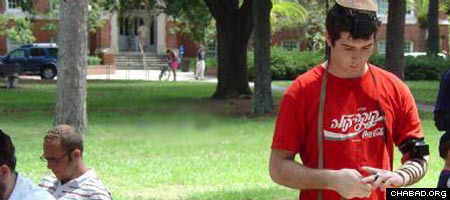Ever go crazy hosting a Rosh Hashanah dinner for friends and family?
Try doing it for 400 hungry college students, and not just for the High Holidays, but for every Friday night and holiday of the year.
"It's quite daunting," said Chanie Goldman, co-director of the Lubavitch Jewish Center at the University of Florida in Gainesville. After a pause and a laugh, she added: "But we've had the practice."
Earlier this week, her husband and fellow co-director, Rabbi Berl Goldman, was still tabulating the final numbers for the Chabad House's holiday programming during the Hebrew month of Tishrei. But he said that the 400 they served and inspired each night of Rosh Hashanah was only slightly more than the 350 who come every single week for a Shabbat evening prayer service and dinner that frequently extends past midnight.
Across North America, approximately 35,750 students took part in holiday celebrations this season at campus Chabad Houses, according to a survey conducted by the Chabad on Campus International Foundation.
One group of Florida numbers Goldman was able to share provided a glimpse into last month's preparations for Rosh Hashanah, Yom Kippur, Sukkot and Simchat Torah, and an execution of programs that continued through the end of last week.
"For Simchat Torah," said the rabbi, "which took place last Friday, we went through 120 pounds of cold cuts, 400 challah rolls, 85 regular-sized challahs, 20 cases of sacramental wine and 15 cases of grape juice, 65 rolls of gefilte fish."
But while such calculations can be mind-boggling outside of a regular campus dining hall, that's par for the course when serving a school with one of the largest Jewish student populations in the country, if not the largest.
"Besides the students who come every week, we have some who come twice a month and twice a year," reported Goldman, whose center plus a tent outside boasts 5,500 square feet of usable space on an acre-and-a-half of land. "If every student came every week, we'd be in trouble. Good trouble, to be sure, but we have at least 2,000 students who come to our events in any given year."
But with a Jewish population, largely unaffiliated, of between 5,500 and 7,500 – the state university stopped keeping track of students' religious identities 12 years ago – out of close to 50,000 students, the Goldmans clearly have their work, now seven years in the making, cut out for them.
"We've continuously expanded since opening in May 2000," said Chanie Goldman. "It started like any traditional model Chabad House would. We barely knew anybody, but from day one we were received very warmly by students and faculty."
A Second Family

"The Chabad House is my connection to Judaism," said Wilkerson, a 21-year-old native of Tampa, Fla. "I met the rabbi a year-and-a-half ago at a pro-Israel rally. I hadn't really done anything Jewish my first two years, and he dragged me over and offered to help me lay tefillin.
"I hadn't done it since my bar mitzvah," continued the biochemistry major. "Afterwards, he told me to come that Friday night, and I did. It's been amazing. Now I try to go every Saturday morning as well."
Ronit Schlesinger, a 20-year-old from Miami, said that on the rare occasions she misses a Friday night with the Goldmans, her whole week feels out of whack.
"There's no greater feeling than going there on a Friday night," said Schlesinger, a junior advertising and psychology major who serves as an advertising executive on the Goldmans' student board. "You get to share moments and values with so many different people. A lot of people tend to see it as a very religious place," but then they go and see that "they don't discriminate. There are people from completely Orthodox to not religious at all."
Berl Goldman explained the importance of being on call 24 hours a day for the students in stark terms. Smack dab in the middle of Florida’s panhandle, students are exposed to so many pressures, from missionary groups to a social life full of pressures and demands.
Equally Theirs
"We emphasize that students should reach out and be in touch with us for anything and everything they need," he said. "We receive requests weekly for faculty intervention, counseling, even help with housing."
He stressed that it's not just the numbers that prove the Chabad House's relevance; individuals lives are constantly impacted by the organization's work. Last year, they attended or officiated at eight weddings of students who met at the Chabad House, he said.
"Students are very attracted to learning meaning, insight and tangible applications of their faith in their lives," asserted Goldman. "Take Sukkot for example. We had rabbinical students who went throughout the dorms and fraternities just so that students could make a blessing on the lulav and etrog.
"Instead of making students come to a religious service," he went on, "here comes a few rabbinical students meeting them and offering a face of Judaism. Giving them part of something that's equally theirs."
So whether it's one-on-one learning with students or a girls-only coffee talk at the local Starbucks, a Challah-baking club or Jewish Heritage Week, midnight breakfast during finals week or bringing out a former National Football League player to talk to students, there's something for everybody at the Chabad House, said Goldman.
"We're empowering students with excitement in their faith, we're empowering them with Jewish knowledge, and they're going out there and spreading it themselves," stated the rabbi. "Through the students, we're able to reach out and touch so many more people.
"When we teach one person aleph, and they teach three friends, and each of them teach three more," he concluded, "that pool of impact keeps growing, and we see that daily."








Start a Discussion